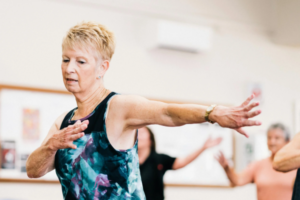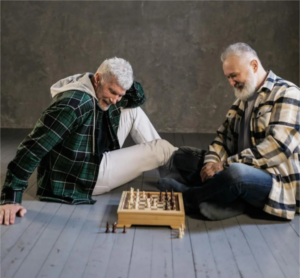The Importance Of Social Interaction For Seniors
Enjoyable social interaction, community and laughter has a healing effect on the mind and body.” – Bryant McGill
 Most people, as they age, often experience many life changes:
Most people, as they age, often experience many life changes:
- retirement
- health challenges
- loss of friends or a spouse
- a move to a new living environment
Making these transitions can leave many seniors feeling isolated and lonely, which is why social interaction becomes a critical part in maintaining their emotional, mental, and physical well-being.
The National Academies of Sciences, Engineering, and Medicine (NASEM) reports that over a third of American adults aged 45 and older experience loneliness, with nearly one-quarter of those aged 65 and older facing social isolation.
6 Key benefits of social interaction for the elderly…
- Prevention of Loneliness and Depression – One of the most immediate impacts of social isolation in seniors is the feeling of loneliness. This can lead to severe emotional issues, including depression.
- According to studies, older adults who lack regular social interaction are more likely to experience depressive symptoms. In contrast, those who engage in social activities such as attending group meetings, joining clubs, or simply spending time with friends and family, report higher levels of happiness and life satisfaction.
- Even light, casual conversations can have a big impact.
- Regular interaction helps keep seniors connected to the world around them, giving them a sense of purpose and belonging. As a result, their emotional resilience grows, enabling them to better cope with the challenges that come with aging.
- Cognitive Health Benefits – Socializing is not just good for the heart but also for the brain. As we age, cognitive decline becomes a major concern, with conditions like Alzheimer’s and dementia becoming more and more prevalent.
- Studies have shown that seniors who engage in social activities are less likely to develop cognitive decline.
- Conversations, puzzles, and games that involve others stimulate the mind, helping seniors stay mentally sharp.
- When seniors engage in intellectually stimulating conversations or group activities like book clubs, they exercise their memory and problem-solving abilities.
- These social exchanges also help improve attention, concentration, and reasoning skills.
- Overall, social interaction serves as a mental workout that keeps their brains active and engaged.
- Studies have shown that seniors who engage in social activities are less likely to develop cognitive decline.
 Improved Physical Health – Social interaction can have a direct affect on physical health.
Improved Physical Health – Social interaction can have a direct affect on physical health.- Research suggests that seniors with active social lives tend to have…
- lower blood pressure
- reduced risk of cardiovascular issues
- better immune system responses
- Social engagement often encourages elderly individuals to get up and move, whether it’s through walking clubs, group exercise classes, or just meeting up for coffee.
- Social activities also reduce stress levels.
- High stress can lead to a variety of health issues, including hypertension and heart disease. But by maintaining regular interactions with others, seniors can experience the calming effects of social support, which helps reduce stress hormones in the body.
- Research suggests that seniors with active social lives tend to have…
- Better Sense of Purpose – For many seniors, especially those who have retired or lost a spouse, a sense of purpose is often felt.
- Social interaction can revive that sense of purpose by providing opportunities to contribute to the community or help others. Activities such as these can help a senior feel valuable, needed and relevant…
- volunteering
- mentoring younger people
- joining senior groups where they can share their experiences
- Having a reason to wake up in the morning and knowing you will engage with the world each day is incredibly important in maintaining mental health.
- When seniors are part of a social circle, they often feel a greater sense of responsibility, which can push them to take better care of themselves and remain independent for longer.
- Social interaction can revive that sense of purpose by providing opportunities to contribute to the community or help others. Activities such as these can help a senior feel valuable, needed and relevant…
 Strengthening Social Networks – As people grow older, their social networks may shrink due to the loss of loved ones, friends moving away, or changes in living conditions.
Strengthening Social Networks – As people grow older, their social networks may shrink due to the loss of loved ones, friends moving away, or changes in living conditions.- Building new social connections or maintaining existing ones is crucial for forming strong support groups that seniors can rely on.
- Having people to turn to for emotional or practical support can significantly improve quality of life.
- Whether it’s assistance with daily activities, advice on health matters, or just someone to share a laugh with, these interactions help seniors cope with life’s challenges more effectively.
- Social support can also buffer the effects of stress and provide a safety net during tough times.
- Boosting Self-Esteem and Confidence – As mobility decreases and health issues arise, many elderly people begin to feel useless and less confident in their abilities.
- Regular social interactions can play a key role in boosting self-esteem.
- Positive reinforcement from friends, family, and peers can remind them of their worth, talents, and importance in the community.
- Being part of a group or maintaining friendships also helps seniors feel less self-conscious about their limitations.
- In situations where they feel safe and accepted, they are more likely to share their thoughts, ideas, and experiences, which can further strengthen their confidence.
- Regular social interactions can play a key role in boosting self-esteem.
The importance of social interaction for the elderly cannot be overstated…
It impacts nearly every facet of their well-being, from emotional and mental health to physical condition. Staying connected with others can help seniors lead fuller, happier, and healthier lives. It will help them not to fall into isolation and depression, but instead thrive in their later years.
In my next blog post, I’ll share some ideas about things seniors can do to be socially active.
We are Certified Senior Move Managers recognized by our National Association of Senior Move Managers, NASMM! We are committed to serving our seniors with a high standard of ethics, best business practices and continuing education to help make whatever transition they are going through a Smooth Transition.
Contact us to learn how we can help you and/or your family with senior downsizing and moving anywhere in the Phoenix East Valley area, additionally we can assist if you are moving out of state.
We offer a Free consultation.
We would love to serve you. 480-339-0011

Comments are closed.